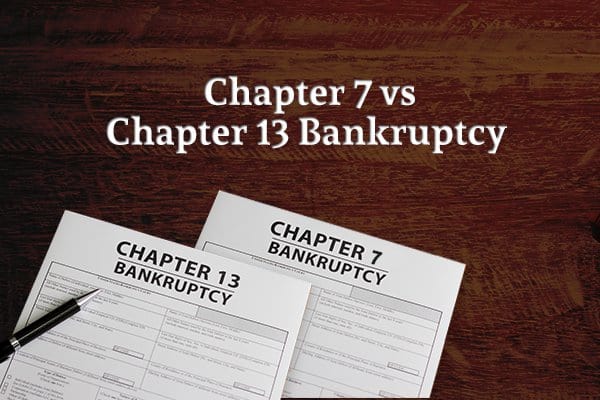
Bankruptcy: Chapter 7 vs Chapter 13
Each year, over 450,000 Americans file for personal bankruptcy protection. The decision to declare bankruptcy can be a hard one, but even once you’ve made the decision, choosing between a Chapter 7 and Chapter 13 bankruptcy can be a challenge.
It’s important to educate yourself on the pros, cons, and procedures of each type of bankruptcy so that you can decide on the best option for your situation. Once you’ve gotten some information on your choices, you can visit an attorney who specializes in bankruptcy proceedings to confirm what you’ve decided and help you through the next steps. Read on to learn more about some of the most fundamental differences between filing a Chapter 7 and a Chapter 13 bankruptcy and what you may be able to expect from each process.
The Differences Between Chapter 7 and Chapter 13 Bankruptcies
Chapter 7 and Chapter 13 bankruptcies differ in two main respects:
- What happens to your debt? - Chapter 7: Any qualifying unsecured debt is discharged. Secured debt, like a mortgage or auto loan, can be discharged (you relinquish the property) or reaffirmed (you keep paying the loan to retain the property)[1][3]. - Chapter 13: You follow a repayment plan (typically 3–5 years) to pay down your debts as determined by the court. Debts are not immediately discharged, but once you complete the repayment plan, remaining eligible debts may be discharged[1][3][5]. - Timeline differences: - Chapter 7 cases are generally resolved in three to six months. - Chapter 13 lasts three to five years, during which you make regular payments[1][7].Both types can impact your credit score, typically causing a significant (but repairable) drop. The negative impact lessens over time and with consistent, on-time payments[1][3][5].
Key Features Comparison Table
| Feature | Chapter 7 (Liquidation) | Chapter 13 (Reorganization) | |-------------------|------------------------------------------|------------------------------------------------| | Eligibility | Pass means test (low income required) | Regular income & debt under set thresholds | | Duration | ~4-6 months | 3–5 years (repayment plan) | | Keep property? | Nonexempt assets may be sold | Debtor keeps property, must pay value of nonexempt assets[1] | | Repay creditors? | No (except from asset sales) | Yes, according to plan approved by court | | Impact on credit | Remains 10 years on credit | Remains 7 years on credit[5] | | Typical for... | People unable to repay debts, few assets | People with steady income, want to keep home/car | | Discharge timing | After proceedings | After completion of repayment plan | | Stops foreclosure?| Temporarily (automatic stay) | Can help catch up on missed payments |How Do You Know Which Type of Bankruptcy Is Right for You?
Consider these decision factors: - Do I want to keep secured assets? If you want a completely fresh start, Chapter 7 may be a better fit—it allows you to relinquish secured assets and start over. Chapter 13 is more suitable if you want to keep your home or car and catch up on missed payments[1][5][3]. - Can I afford my debts if payments are streamlined? Chapter 7 is best for those overwhelmed by unsecured debt and who cannot feasibly repay it. Chapter 13 may be better for those with steady income, significant assets, and a realistic path to repaying at least a portion of their debts[1][3]. - Are any of my debts non-dischargeable? Some debts—like student loans, alimony, child support, and certain tax debts—cannot be eliminated through bankruptcy. If most of your debt is non-dischargeable, bankruptcy may provide limited relief[1][3][5].Hiring a Bankruptcy Attorney
Because there are strict limitations on how often you can file for bankruptcy, it is critical to have expert guidance as you prepare and file. A bankruptcy attorney ensures all qualifying debts are included and that you select the most advantageous form of bankruptcy for your situation. Missing a key debt or making the wrong choice can lock you out of relief for years. If you are considering bankruptcy, reach out to Machi & Associates, P.C. Their experienced attorneys will guide you through every step and help you achieve a fresh financial start.






